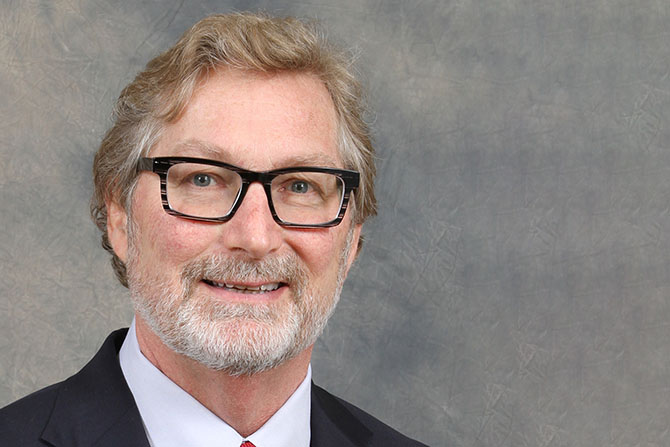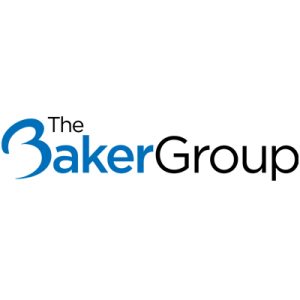Longtime financial strategist Jeff Caughron is retiring this year from The Baker Group after decades of service in roles including CEO and Chairman. He offers some thoughts and lessons he’s learned over his career.
You’ve been involved in banking and investments for nearly 40 years. Talk about the early days of your career.
I got into this business in the mid-1980s when Paul Volker was Fed Chairman and inflation was coming off high boil. There were about 15,000 banks back then, scrambling to adapt to rapid changes in technology as well as historically unprecedented market conditions. I went to work for a small innovative firm then named James Baker and Company. The founder, Jim Baker, was an academic who applied simulation modeling for interest rate risk management. He developed probably the first PC-based model for community banks. The biggest challenge we had at the time was that many banks still didn’t have a PC. That situation quickly changed, putting our firm at the forefront of helping banks manage interest rate risk. That’s the reason Dr. Baker is appropriately called the “Father of Asset/Liability Management.” I was fortunate to land there right out of school.
There have been major changes in the banking industry and markets since the 1980s. Describe that evolution from your perspective.
Well, industry consolidation over the years has sharpened well-defined differences between traditional community banks versus the larger regional and international banks. Regulators have adapted somewhat, but in my opinion, they still apply too much of a cookie-cutter approach to identifying risk and ensuring sound practices. The business models and risk profiles of community banks are vastly different from larger money-center institutions, and those differences have become more pronounced over the years.
The other major changes have been in technology. We’ve come a long way since the ‘80s when software was delivered by snail mail on 5 ¼-inch floppy discs. Everything changed with the explosion of internet and email communication in the 90s. Then we all ditched our flip phones, first for Blackberrys, then iPhones after 2007. Today everyone’s rushing to adapt to cloud-based processes and AI-enhanced automation. So, the process continues.
You haven’t spent your entire career at Baker, though, right?
That’s correct. I left at the end of the 80s and spent several years working in the New York offices of a large foreign bank. My work primarily involved hedging and trading Treasury positions. That’s where I really learned what drives markets and yield curve behavior. I experienced things from an international perspective, sitting alongside currency traders in the World Trade Center. But I left New York in the mid-90s to return to the Midwest. In 2004, I returned to Baker. So, I’ve been back almost 20 years.
So, you’ve seen your share of crises, financial and otherwise. Which ones are most impactful, and what lessons can be drawn?
The 1987 stock market crash was notable. The Dow lost over 20% of its value in a day. That’s never happened before or since. Then there was a series of issues in the late 90s. The Asian currency crisis, the Russian debt default and others. But September 11 was the most horrific event in my career. Having worked in the north tower, it was a particularly painful time followed by great uncertainty.
As for specific market events, nothing compares to the 2008 financial crisis and subsequent “Great Recession.” For me, and for The Baker Group, I think it was a time when we were uniquely qualified and prepared to help our clients make sense of the crisis and navigate the uncharted waters that followed. Things such as negative interest rates and quantitative easing had always been just theoretical concepts for the most part. Suddenly, we were having to deal with those concepts as realities, and we had to adapt our systems and strategies accordingly. Fortunately, we dodged some bullets that hit our competitors. We specifically avoided the temptation of selling complex, non-traditional securities that blew up or became hopelessly illiquid. We also had the advantage of our expertise in interest rate risk management and our proprietary software. Our reputation was bolstered in the wake of the crisis. Now, of course, we’re going through another sea change in the wake of the COVID pandemic. The economic impact, the policy response and the ripple effects of all that’s happened since early 2020 make this a remarkable time indeed, yet we still haven’t seen how this movie ends.
Are you talking about the Fed policy response, specifically?
Well, it’s more than just that. The way business gets done was changed by the pandemic and complicated by geopolitics. Labor market behavior and supply chains are good examples. The impact of these issues is above and beyond the Fed’s extremely tight monetary policy.
As for the Fed, we all know by now that they were very late to recognize how powerful the inflationary impulse would be in the wake of the initial COVID response. They got behind the curve and had to aggressively catch up by tightening with unprecedented speed. Now, we seem to be at an inflection point, but I fear a more painful phase of this cycle is yet to come. Time will tell.
Are there people who have been particularly influential in your professional career?
Oh yes. I’ve been privileged to work with, and learn from, some brilliant individuals. Dr. Baker was my intellectual mentor early on. But through the years, I’ve gained incredibly valuable insights from people such as Lacy Hunt, Gary Shilling and Dave Rosenberg. And, of course, my partners through the years at Baker have been wonderful. You won’t find a smarter group of professionals or one with greater integrity. And our clients reflect that as well. I greatly appreciate each and every one of them.
The Baker Group has been a trusted financial partner helping community financial institutions improve their decision-making, interest rate risk management, and investment portfolio performance since 1979. To learn more, please visit www.gobaker.com.







